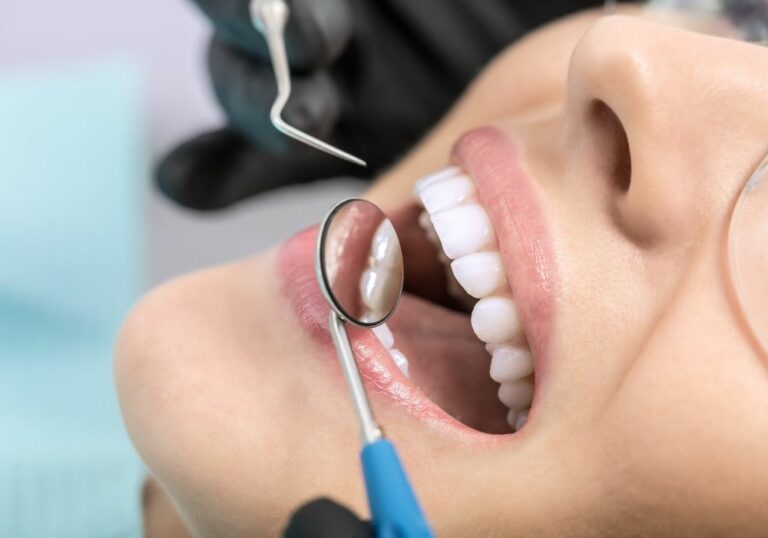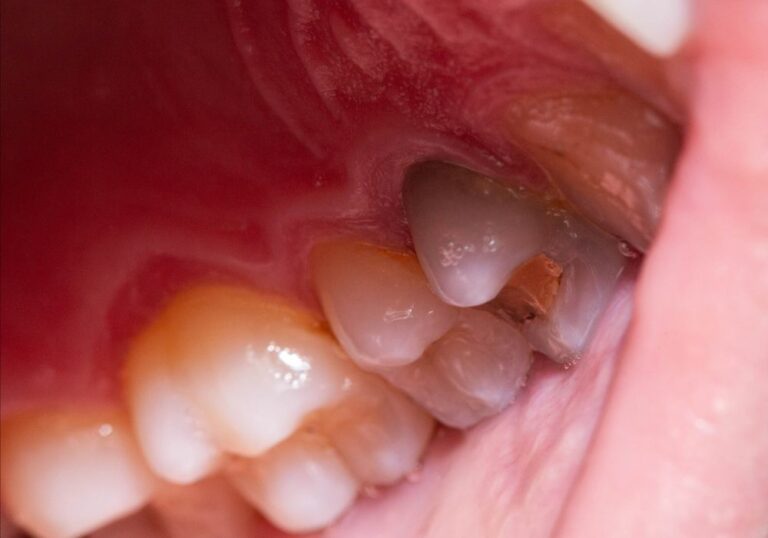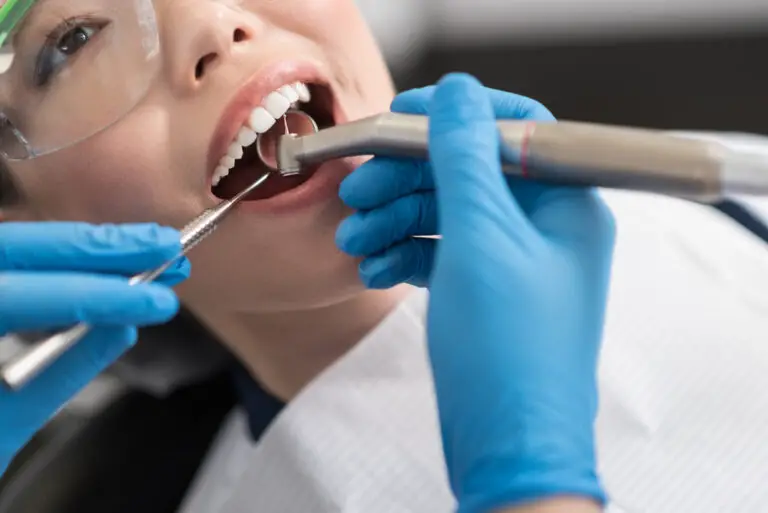Overview of tooth sensitivity
Tooth sensitivity, also known as dentin hypersensitivity, is a common condition that affects millions of people. It is characterized by sharp pains or discomfort in the teeth when exposed to certain triggers, such as hot, cold, sweet, or acidic foods and drinks. The pain is usually temporary and goes away once the trigger is removed.
Tooth sensitivity occurs when the dentin layer underneath the tooth enamel becomes exposed. Dentin contains thousands of microscopic tubules that lead directly to the nerves in the pulp of the teeth. When these tubules are exposed, external stimuli can irritate the nerve endings, causing pain and discomfort.
There are many potential causes of dentin exposure and tooth sensitivity. Some of the most common include:
- Gum recession – When the gums recede, it exposes the root surfaces and dentin. This is a common cause of sensitivity on the neck of the teeth near the gum line.
- Loss of enamel – Over time, enamel can become worn down due to factors like teeth grinding, erosion from acidic foods and drinks, and improper brushing. This allows the dentin underneath to become exposed.
- Tooth cracks or fractures – Cracks in the teeth from injuries, grinding, or extensive dental work can allow dentin tubules to become exposed to the surface.
- Dental procedures – Some dental treatments like teeth cleanings and fillings can cause temporary sensitivity by irritating the inner dentin layer.
- Tooth whitening – The chemicals used in tooth whitening procedures can make teeth more porous and expose more dentin tubules, causing sensitivity.
Why are teeth sensitive to movement?

Many people report increased sensitivity or pain when their teeth are touched, tapped, or have pressure applied to them. But why does this happen? There are a few key reasons why teeth may become more sensitive with movement or percussion:
1. Movement stimulates fluid shifts
Dentin contains a layer of fluid inside the thousands of microscopic tubules. Tapping or moving the teeth causes rapid shifts and changes in pressure within these fluid-filled tubules. This sudden fluid movement stimulates nerve endings at the pulp, causing temporary pain or sensitivity.
2. Inflamed nerves
Inflammation or irritation of the nerve endings in the tooth pulp can make them extra sensitive to any stimulation. Causes include dental procedures, tooth decay, cracks, and chronic grinding/clenching. Even subtle tooth movement can trigger sharp pains from inflamed nerves.
3. Loss of periodontal support
The ligaments and bone around teeth provide important support and protection. When gum disease sets in, the loss of connective tissue, bone, and ligament attachments allows more movement between teeth. This mobility then exposes more dentin tubules to stimuli, heightening sensitivity.
4. Occlusal trauma
Abnormal bite alignment, missing teeth, or uneven chewing forces can lead to occlusal trauma. This is injury to the teeth, ligaments, bone, and nerves caused by excessive biting forces over time. The trauma exposes dentin and inflames nerves, making teeth extremely sensitive to touch or pressure.
Risk factors for sensitive teeth
While tooth sensitivity can happen to anyone, certain factors can increase your risk:
- Aggressive oral hygiene habits – Overly vigorous flossing and brushing with hard-bristled toothbrushes can abrade enamel over time.
- Acidic dietary habits – Frequent consumption of acidic foods and drinks like citrus fruits, tomatoes, wine, and soda can erode enamel.
- Teeth grinding – Chronic teeth grinding (bruxism) wears down enamel and stresses teeth.
- Gum disease – Gingivitis and periodontitis break down gum and bone support, exposing root surfaces.
- Dental work – Improper polishing after professional cleanings can remove protective enamel coating. Some procedures like root planing also cause sensitivity.
- Tooth whitening – The concentration of chemicals in some whitening strips, gels, or treatments may irritate dentin tubules.
- Age – As you get older, enamel thins and gums recede, making teeth more susceptible to sensitivity.
- Genetics – Some individuals are just predisposed to thinner enamel or gum recession.
When to see a dentist

Mild or temporary tooth sensitivity from a one-time trigger often resolves on its own within a few days. But if you experience persistent sensitivity to hot/cold foods, sweet/sour treats, air flow, or tooth movement, you should make an appointment with your dentist. Consistent sensitivity may indicate an underlying dental issue in need of treatment.
See your dentist immediately if sensitivity is accompanied by other worrisome symptoms, such as:
- Lingering pain that lasts for several hours or days after a trigger
- Spontaneous sharp pains with no apparent cause
- Sensitivity accompanied by tooth discoloration, chipping, cracks, or lesions
- Sudden sensitivity in multiple teeth
- Sensitivity combined with gum swelling, redness, or tenderness
These symptoms could reflect extensive tooth decay, fractures, gum disease, or root sensitivity that requires prompt dental care. Don’t delay in getting evaluated.
Diagnosing causes of tooth sensitivity
When you see a dentist for sensitive teeth, they will perform a comprehensive oral exam and gather your health history to try to pinpoint the source. Some of the diagnostic tools used may include:
- Visual exam – Checking for signs of decay, cracks, wear, gum recession, and irritation.
- Dental explorer – Using a fine metal pick to feel for subtle cracks, pits, or irregularities in tooth enamel.
- Percussion – Tapping lightly on teeth with an instrument to test for discomfort or sensitivity.
- Cold stimuli – Applying a cold air jet, ice water, or tool to see if temperatures provoke a painful response.
- Radiographs – X-rays that help identify underlying tooth decay, bone loss, or abnormalities.
- Pulp vitality testing – An electric test that measures nerve activity in the tooth pulp to check for inflammation or necrosis.
- Probing depths – Using a periodontal probe to measure space between gums and teeth to check for gum recession.
Once the source of sensitivity is identified, your dentist will recommend appropriate treatment options.
Treatment options for sensitive teeth
The treatment for tooth sensitivity depends on the underlying cause. Common options dentists may suggest include:
1. Desensitizing toothpaste
Special toothpastes containing compounds like strontium chloride or stannous fluoride help block sensations in exposed dentin tubules. They can provide temporary relief for generalized sensitivity in multiple teeth.
2. Fluoride treatments
In-office fluoride applications or prescription home fluoride gels/rinses help strengthen enamel and reduce dentin permeability. They are most effective for mild cases.
3. Dental sealants
Applying resin coatings or sealants onto the root surfaces exposed by gum recession can shield dentin from stimuli. The effects last several years.
4. Dentinal fillings
For specific sensitive spots, a dentist may fill exposed dentinal areas with composite resin or glass ionomer cement to block external stimuli.
5. Gum grafting surgery
This periodontal procedure covers exposed root surfaces by transplanting soft tissue from the roof of the mouth. It offers permanent relief in cases of gum recession.
6. Occlusal adjustment
Realigning teeth through selective grinding can correct bite issues or trauma that may be causing sensitivity. This allows even distribution of chewing forces.
7. Nightguards and mouthguards
Custom dental appliances worn during sleep or sports can protect teeth from grinding damage and reduce sensitivity.
8. Root canal therapy
If sensitivity stems from inflamed or damaged tooth pulp, a root canal might be needed to remove the nerve and pulp tissue.
The prognosis for sensitive teeth is generally good with proper treatment. But more serious cases from extensive decay, fractures, or advanced gum disease may still result in tooth loss if damage is too severe. Regular dental cleanings, daily brushing, and avoiding acidic foods can help protect your teeth. See your dentist right away if you suddenly develop any unexplained tooth sensitivity.
Frequently Asked Questions
1. Is sensitive toothpaste effective for treating sensitivity?
Yes, desensitizing toothpastes can provide relief in many cases of sensitivity. They contain active ingredients like stannous fluoride, arginine, or strontium chloride that work by sealing dentinal tubules. This blocks external stimuli from reaching the inner tooth nerves. Effects are temporary, so ongoing use is needed.
2. How long does tooth sensitivity last?
This depends on the cause. Sensitivity from a dental procedure may resolve within a few weeks as inflammation subsides. Sensitivity from receded gums, worn enamel, or tooth grinding tends to be more long-lasting unless properly treated. With proper care, products, and treatment, sensitive teeth can be managed.
3. Can sensitive teeth be a sign of something serious?
It’s possible in some cases. Sudden tooth sensitivity combined with dental pain, swelling, or other worrisome symptoms can potentially indicate an urgent dental issue in need of evaluation. This includes possible dental emergencies like infections, fractures, or advanced decay. See a dentist right away if sensitivity is severe or persists beyond a few days.
4. What foods should I avoid with sensitive teeth?
Limiting acidic foods like citrus fruits, tomatoes, carbonated beverages, wine, and sour candies can help prevent exacerbation of sensitivity. Hot, cold, sweet, and sticky foods can also trigger pain in sensitive teeth for some people. Avoid chewing ice and hard candies which may fracture teeth.
5. Can sensitive teeth be prevented?
Practicing good oral hygiene, using a soft-bristled brush, avoiding aggressive brushing, and getting regular dental cleanings and check-ups can help prevent the enamel erosion that leads to sensitivity. Your dentist may also recommend specialty toothpastes, dental sealants, or fluoride treatments to strengthen your tooth enamel.







